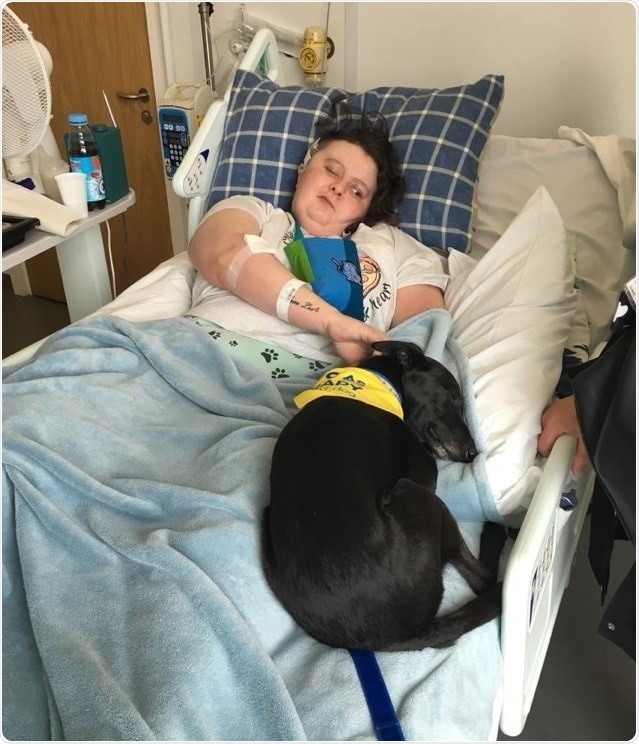Eye research charity Fight for Sight is partnering with the Stroke Association to test the effectiveness of a treatment for ‘retraining’ the eyes for people who experience a loss of vision after stroke. The study hopes to establish a new standard of care for stroke survivors and save the NHS money.

Tara Playle in the hospital with her service dog Flash
The charities have announced funding for the project on World Stroke Day (October 29th, 2020).
Hemianopia – the loss of vision or blindness in half the visual field on the right or left side - occurs suddenly in 30% of stroke survivors and can have a devastating impact on their quality of life. Currently, there is no cure and treatment to help those with hemianopia compensate for their sight loss is variable and not standardized in the NHS. This is due to uncertainty about what works best and when is the best time to offer treatment, resulting in unfair differences in the care people receive.
Tara Playle had a stroke at the age of 24 that severely affected her sight. She said: “I had to surrender my driving licence and am at risk of tripping due to my limited sight so have to take extra care when I walk about.
“My limited vision is a hidden result of my stroke as my eyes appear normal. But losing my sight has been a key factor that has taken away my independence. Any research that can better treatment for sight loss due to stroke would be invaluable, and I believe if treatment enabled my sight to be improved I would be able to do a lot more and rely less on other people.”
Visual scanning training encourages stroke survivors to look into the ‘blind’ side of their visual field. This can improve a stroke survivors adaptation to loss of vision. They are asked to repeatedly practice locating targets in both the ‘seeing’ and ‘blind’ sides of their visual field. This study, which will be run by researchers at the University of Liverpool, was designed with the help of five stroke survivors and will use paper-based visual scanning training as it is cost-effective, available to all stroke survivors and it allows them to practice training at home.
In the study, a group of 71 stroke survivors that receive eye scanning training will be compared to a group of stroke survivors that don’t. They’ll be followed for six months to see if the treatment can improve vision, and independence in everyday activities. All the information will be collected during routine eye clinic visits.
Professor Fiona Rowe from the University of Liverpool is leading the study.
This study builds on an initial promising pilot trial and addresses an area of treatment for which there is limited evidence and no standard care in the NHS. Visual scanning training has the potential to benefit stroke survivors by improving their adaptation to hemianopia and it can be done at any time, any where. There is also potential for cost-savings in the NHS and social care sector through maximizing stroke survivors’ use of their remaining vision, and therefore lessening its impact on daily life activities. This treatment is a top priority highlighted by two national surveys involving large numbers of patients and carers.”
Professor Fiona Rowe, University of Liverpool
Director of Research at Fight for Sight, Dr Neha Issar-Brown said: “We are so pleased to partner with Stroke Association to fund this pivotal research study. If successful, this research has the potential to help ensure better outcomes for countless people who experience sight loss due to hemianopia. Crucially, it will also help establish a much-needed standard of care for stroke survivors. Sight loss can have a devastating impact on those who experience it and many people with sight loss are living with or have been affected by another health condition. Hemianopia is a devastating example of where the challenges of life after stroke and sight loss are compounded and is an area of unmet need. We wish Professor Rowe and her team at University of Liverpool the best of luck with this much-needed research.”
We’re excited to work with Fight for Sight to fund this research that can change the lives of stroke survivors with sight loss by improving the standard of treatment offered by the NHS. The amount of money available for stroke research is much lower than for other life-changing health conditions, such as cancer, so it’s important to work together to increase funding for stroke research that can drive improvements in treatment and care so more people can rebuild their lives after stroke.”
Dr Rubina Ahmed, Research Director at the Stroke Association
The research study is due to get underway on December 1st, 2020.